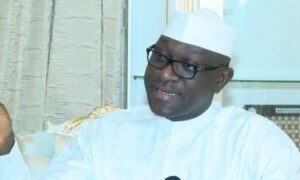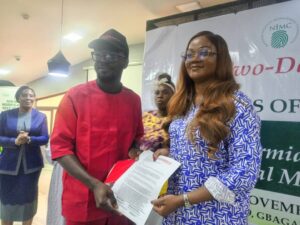
Sudan crisis: FG spends $1.2m to evacuate 2,400 Nigerians to Cairo by bus
…$1.2m spent to evacuate 2,400 of planned 5,500 persons
…Cites security reasons for huge cost
An estimated sum of about $1.2 million, believed to be provocative, has been spent to deploy 40 buses to evacuate about 2,400 stranded Nigerians out of crisis-ridden Sudan, the Federal Government has said.
The Minister of Foreign Affairs, Geoffrey Onyeama, disclosed this to State House correspondents, Wednesday, shortly after the Federal Executive Council (FEC) meeting presided over by President Muhammadu Buhari at the Council Chambers of Aso Rock Villa, Abuja.
The sum has generated reactions but reasons for the huge cost said to have been spent on the evacuation, as given by Onyeama, was to provide security cover for the eight-hour journey from Luxol to Cairo and the eleven-hour trip from Aswan to Cairo, Egypt.
Although the Sudanese Armed Forces and the Rapid Support Forces agreed to halt hostilities at midnight Monday, local media reported that fighting had resumed even as a hospital was shelled on Wednesday.
Onyeama noted that no life of a Nigerian was lost in the conflict, adding that there were no talks about alternative plans for continued education for the evacuees, most of whom are students of the University of Khartoum.
At least, 40 buses were reported to have been deployed to move Nigerians out of Khartoum and other troubled parts of Sudan early Wednesday.
According to the Nigerians in the Diaspora Commission, the evacuation planned for Tuesday failed due to logistical challenges.
Chairperson of the Commission, Abike Dabiri-Erewa, confirmed that the new travel plans were finalised Tuesday night.
“Last night, the Nigeria Evacuation team in Sudan received some buses to transport Nigerian Students to nearby borders in Egypt, before airlifting them to Nigeria, this has been sorted by the Federal Government through @nemanigeria and the Nigerian Embassy in Sudan.
“More buses are arriving this morning and the stranded students will depart today,” she said in a tweet.
Recall the Federal Government had disclosed earlier that about 5,500 stranded students and other Nigerians in Sudan will be evacuated by road.
Onyeama, had on Sunday about 15 days after fighting between Sudanese army and the paramilitary plunged the Country into crisis, said that his Ministry had been briefed that an estimated 5,500 Nigerian citizens, which include students, workers and others are ready for the evacuation.
He had disclosed that the evacuation plan to use road travels became an option following the attack on the flight of the French rescue team in Sudan.
“We have been given the cost estimate and all the details. They gave us a figure of 5,500 who are ready for evacuation. Obviously, what you need in a situation like this is a place where everybody can congregate before you start moving them out.
“Because the airports, as you pointed out in your report, is out of commission. The only viable way out is by road. Of course, it’s totally safe. So, we want to require the government to provide some security and a safe corridor out.
“Our situation is particularly challenging because the numbers are so great. Some of the countries like the US and European countries have started evacuation. But what they have been evacuating were actually their diplomatic staff.
“They haven’t been able to start evacuation of their citizens there. We can’t evacuate all our diplomatic staff at the moment because they need to also coordinate the evacuation of all those students that we’re talking about,” Onyeama had said on Channels Television’s ‘Sunday Politics’ Programme, Sunday night.
Adding that his Ministry is taking careful steps not to endanger the lives of stranded Nigerians by soliciting security protection from the Sudanese authorities, the Minister had said before the Nigerian Government were three options to accomplish the rescue mission through the Egyptian border, Port Sudan, and the Ethiopian border.
“So, essentially, where we are at the moment is trying to get the authorisation from the Sudanese government to undertake this long journey and for them to provide some security.
“Now, we don’t want to take any risk or risk the lives of any Nigerian, because from what we saw yesterday, for instance, how the French in trying to evacuate their citizens came under fire. We don’t want to expose our brothers and sisters to that danger as well.
“We are doing everything we can to get the requisite approval for the Sudanese government at the very highest level. I was in touch today with somebody in the Office of the President and made a formal request to have a safe corridor to evacuate our people. And they confirmed that they had received it and they would be giving us attention.
“The three options available to us include the Egyptian border, Port Sudan and Ethiopian border,” he had said.
The conflict between the Sudanese armed forces and the paramilitary group, Rapid Support Force, has claimed hundreds of lives with over 3,500 injured.
The clashes have also displaced thousands of civilians who fled the capital, Khartoum, as the violence, which started on April 8, entered its 18th day on Wednesday.
Until recently, the Sudanese Armed Forces, led by General Abdel al-Burhan, and the RSF paramilitary group, headed by General Mohamed Dagalo, were allies.
They worked together in 2019 in a popular uprising that overthrew Sudan’s brutal dictator, Omar al-Bashir, who ruled the Country for three decades.
Nigerian NewsDirect had reported how there had been apprehension over how to evacuate Nigerians stranded in the crisis torn Sudan.
The Presidency on Sunday had said it was worried over the fate of thousands of Nigerian citizens stranded in Sudan amidst crisis worsened by dangers posed to air travel in the North African Country.
The Presidency had also mentioned that the worries have posed to it challenges of “sleepless night” over the safety of Nigerians stuck in the Country.



